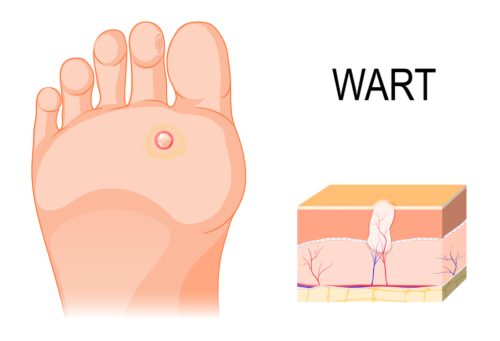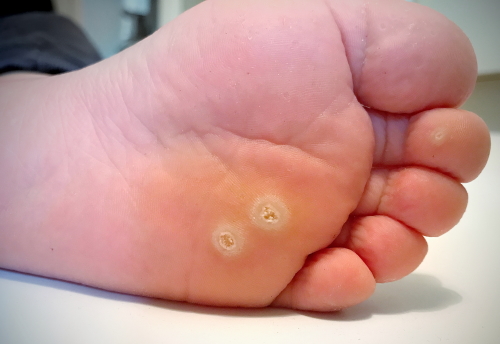
There is nothing more exciting than the first rush of spring and summer. We clean out the cobwebs of winter, brush ourselves off, and head outside for any number of activities. The last thing we want to think about is plantar warts. But the risk of walking around barefoot, using public showers and pools, and cutting your foot or hand, can be the culprit in many cases of plantars warts.
What are Plantar Warts?
Plantar warts are a viral infection within the skin. The warts are caused by the HPV or human papillomavirus. There are many different strains of the HPV virus, only a few which cause warts on the feet. Other types of HPV are more likely to cause warts on other areas of your skin or on mucous membranes. Typically, plantar warts are non-cancerous and are not harmful.
The infection gains access to the skin through direct contact by means of an open cut or wound or by direct or indirect contact with someone who has a wart. For instance, a child with a wart on their hand may touch a piece of playground equipment and when another child touches that surface, the wart spreads to that child. Another way, as mentioned above is using public showers at pools or waterparks without wearing shoes. 
What Do They Look Like?
Plantar warts are small and can appear as little black dots first, growing to the size of a pencil eraser and sometimes can grow in clusters; those are called mosaic warts. They are usually flat with a smooth surface and have a gray-yellow or brown color. Plantar warts usually appear on the heel and ball of the foot or other areas of pressure. It’s a good idea to have suspicious growths examined by a doctor because a variety of more serious lesions can appear on the foot and be misidentified as a wart.

What are the Treatment Options?
There are a variety of ways to treat plantar warts. First and foremost, it’s not fast and easy and can take up to a few weeks to a few months because the warts lie deep within the skin layers. Unlike other types of viruses that the body can recognize and fight, the wart shields itself in the skin so the body can’t detect it. So treatment can be difficult. The recurrence rate can be higher or lower depending on the treatment type, and immunity can be an issue.
Acid treatment is most often used in our office and requires a few applications. If the wart is more stubborn, anesthetizing and cutting out the wart is also an option.
Many people will opt for over-the-counter (OTC) ointments and liquids. However, serious problems can occur with prolonged use of overly aggressive OTC treatments (more than two weeks). Skin irritation, infection, pain and scarring are a few. OTC medications are also not recommended for infants, people with diabetes, or other circulation problems.
Tips to Avoid Plantar Warts
- Avoid walking barefoot in public showers or at pools or water park bathrooms (beach walking is fine)
- Change shoes and socks daily and avoid sharing socks, shoes and showering facilities
- Keep feet clean and dry
- Check your children’s feet regularly during warm weather months
- Don’t touch warts on other people
- Don’t scratch warts or they will spread
- Warts should be covered with waterproof tape in wet environments and swimming pools to avoid infection and infecting others
- Do not ignore growths on, or changes in the skin
What to Expect If You Get a Wart
Roughly 60 percent of plantar warts disappear on their own in what is called “spontaneous remission.” This happens because the body’s immune system takes action to kill the virus. But if stubborn warts don’t go away and are left untreated, they can grow up to one inch across and spread into clusters and cause pain, swelling, or bleeding.
Warts can also grow back after treatment and this indicates that the virus is still present. This is not serious, but the warts can spread to other parts of the body, particularly if they are scratched because blood from the wart contains the virus and can cause a new warts to grow. The best advice is to seek treatment and as soon as you notice the signs of a growth or the “black seed” of a wart.
Please feel free to Contact Us with any questions about plantar warts, or you can Make An Appointment to see Dr. Caruso.